Specialty Pharmacy Trends Report: Infertility
According to the Centers for Disease Control and Prevention, 7.4 million women 15 to 44 years of age have used infertility services. Thus, 1 in 8 people have received fertility assistance in the United States. While these services have helped a number of people become parents, much debate exists over whether insurance plans should cover fertility treatments. The risk of preterm birth and low birth weight are higher among infants conceived through assisted reproductive therapies compared to infants in the general population, and preterm births cost society approximately $26 billion annually.
Currently, only 15 states have passed laws requiring insurers to cover or offer coverage for infertility diagnosis and treatment. A variety of options exist to treat infertility. In some cases, intrauterine insemination, in vitro fertilization, or surgery are necessary to address fertility challenges.
___________________________________________________________________________________________________________________________________________________
The survey respondents were asked if they were involved in reporting adherence and/or compliance on the use of infertility medications obtained through specialty pharmacy, and 68.52% said “never,” while 24.07% said “rarely” (Figure 1).
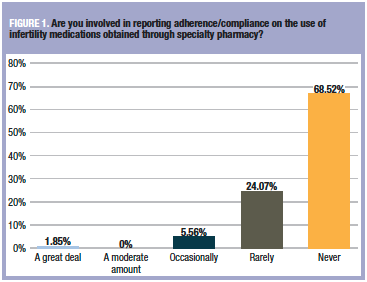
A large majority of survey participants (64.81%) said they were unsure as to what percentage of specialty pharmaceuticals for the treatment of infertility require in-office administration of the drug in their facility. Another 22.22% of survey participants said 0% to 25% (Figure 2).
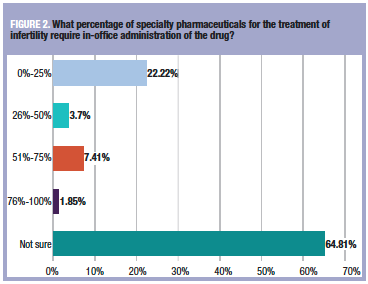
More than half of survey participants (55.56%) said insurance is how payment is most often accrued for patients receiving infertility treatments, while 31.48% said direct billing to the patient (Figure 3).
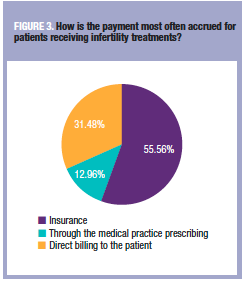
When the survey respondents were asked if they felt as though there has been an increase in fertility drug usage over the past 5 years, 46.3% said they felt a slight increase, 29.63% said a large increase, and 24.07% said no increase (Figure 4).
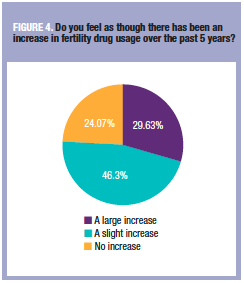
The survey respondents were divided over whether a mental health component should be implemented as part of the treatment of infertility; 51.85% said “yes,” 42.59% said they were unsure, and the remaining 5.56% said “no” (Figure 5).
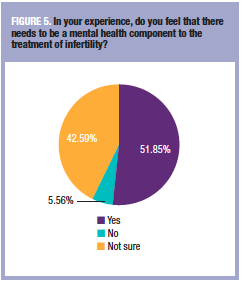
Specialty pharmacy is a burgeoning field that continues to be of importance for managed care professionals. With the rates of chronic, high-cost conditions increasing, payers are eager to find ways to diffuse costs, while also providing patients with the best care possible. First Report Managed Care partnered with the National Association of Specialty Pharmacy to put together this Specialty Pharmacy Trends Report.
The information for this trends report was generated through a comprehensive survey developed via the collaborative efforts of an Advisory Panel of key thought leaders and the First Report Managed
Care editorial staff. This survey was then sent to a diverse pool of specialty pharmacy professionals. This is part 2 of a 3-part series we bring to you on the climate of specialty pharmacy as it relates to the managed markets. We hope that you find the information presented to be practical, informative, and compelling. We hope the survey results serve as a resource you can use in making future management decisions.
Survey Participant Demographics
Key thought leaders in the field of specialty pharmacy have provided the information collected in this Specialty Pharmacy Trends Report series. The following are the demographic responses, providing a snapshot of the survey participants and the organizations for which they are affiliated.
The Northeast is home to most of the survey participants (33.93%), while 28.57% of participants are in the Midwest, 10.71% in the Southeast, 10.71% in the Pacific, 10.7% in National regions, 3.57% in the Mountain region, and 1.79% said “not applicable.”
The majority of the survey respondents (60.71%) have a PharmD degree, while 39.29% have a BS in
Pharmacy, 17.86% have an MBA, 10.71% have an MS, and 5.36% have a PhD. A significant majority of survey participants (53.57%) have an RPh certification, while 17.86% have a BCPS, and 12.5% have a CSP.
When asked how long they have been in the specialty pharmacy field, 35.71% of survey participants said 0 to 5 years, while 28.57% said 11 to 20 years, and 26.79% said 6 to 10 years.
Mail-order specialty pharmacy is the primary facility of work for 23.21% of the survey participants. An additional 16.07% said their primary facility of work is an academic institution (not a university hospital), another 16.07% said a managed care organization, 14.29% said a retail specialty pharmacy,
and 10.71% said a consulting firm.
When asked what type of specialty pharmacy they are involved with, 26.79% of the survey respondents said independently owned (nonretail) and another 26.79% said pharmacy benefits manager. Another 16.07% of the survey respondents are involved with a health plan-owned specialty pharmacy and 14.29% are retail pharmacy owned.
Most of the survey respondents (39.29%) reported that they have 1% to 25% of patient interaction time on a monthly basis, while 28.57% said their role does not currently involve patient interaction.
When the survey participants were asked to select the top 5 therapeutic categories with which they are most involved, and with the option to select up to 5 areas, the results were the following:
• Oncology (69.64%)
• Rheumatoid arthritis (67.86%)
• Hepatitis C (64.29%)
• Multiple sclerosis (50%)
• Diabetes (37.5%)
• Crohn’s disease (35.71%)
• Psoriasis/Psoriatic arthritis (35.71%)
• HIV/AIDS (25%)
• Hemophilia (23.21%)
• Immunoglobulins (12.5%)
• Cystic fibrosis (8.93%)
• Hereditary angioedema (5.36%)
• Gout (3.57%)
• Infertility (1.79%)










